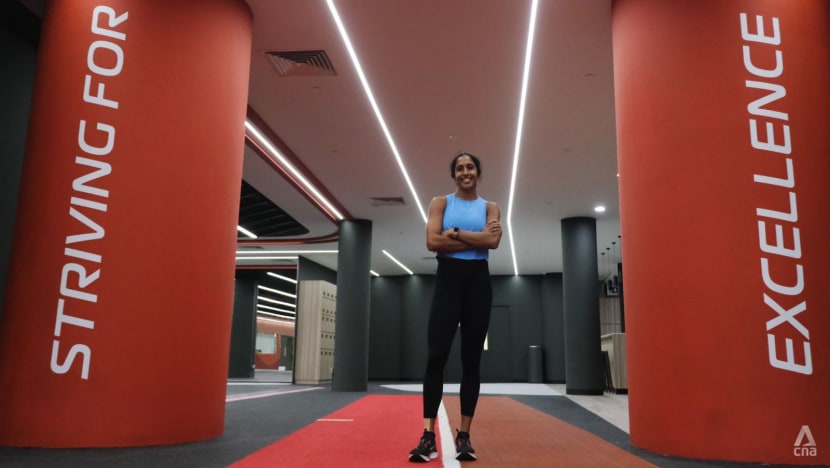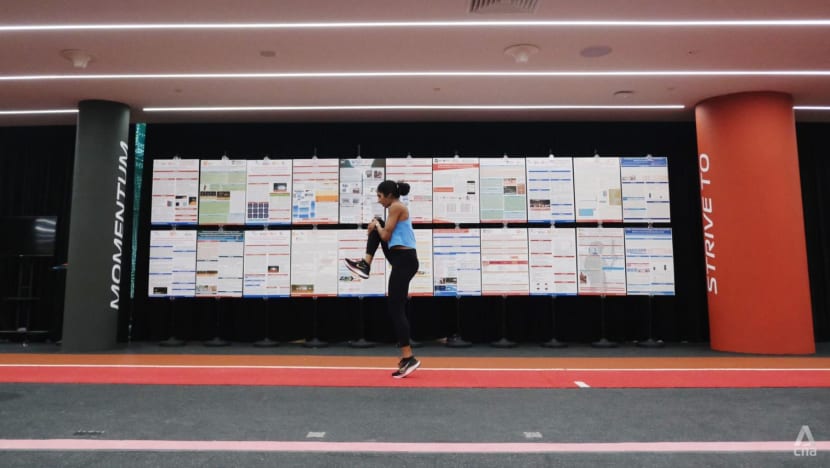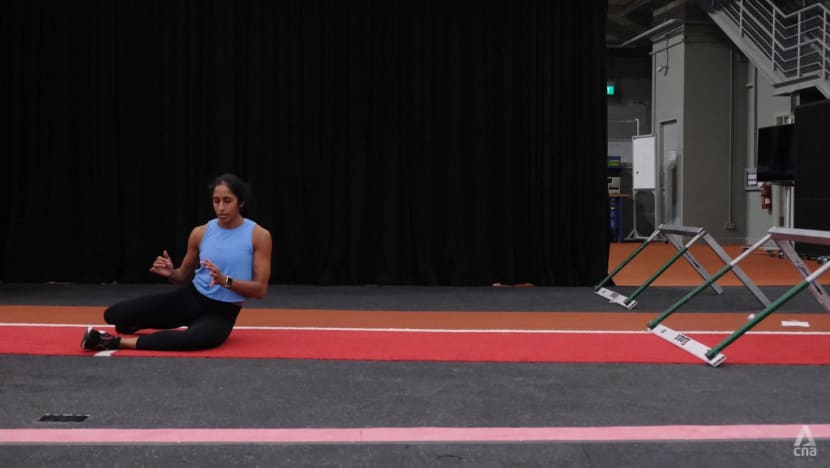No stranger to adversity, Shanti Pereira aims to put injury setback behind her as Olympics nears
CNA spoke to Singapore's sprint queen about her recent injury, the subsequent recovery, and preparations for the Paris Olympics.

Shanti Pereira will head to Europe next week to resume preparation for the upcoming Paris Olympics. (Photo: Matthew Mohan/CNA)

This audio is generated by an AI tool.
SINGAPORE: Life in the past year has taken Shanti Pereira to all sorts of places, from standing on top of medal podiums to being feted at awards ceremonies marking her achievements.
But it also led her somewhere else she didn't want to be last month. A clinic.
Whether she liked it or not, life in the fast lane would have to slow down.
A PAINFUL SETBACK
It was close to two months into a training stint in Florida that Pereira began noticing a slight pain in her right calf.
The Singaporean had been there since the first week of February for sessions at the National Training Centre in Orlando.
"There was no significant moment that caused it, it's just that over time it got a bit more painful," she told CNA in an exclusive interview on Thursday (May 16).
The injury got a bit more "worrying" after she competed in a 400m race at the University of Florida. Pereira finished fifth but broke the 400m national record.
"I thought I'd just let it rest for a few days, because after that I was going to come back to Singapore," she recalled.
But with the pain showing no signs of subsiding after a training session, Pereira knew she had to seek medical advice. While she was hoping for the best, she was bracing for bad news.
Scans would reveal a stress injury in her fibula.
It came as a big blow to Pereira as it meant she would miss her debut in the Diamond League competition in Xiamen and Shanghai, as well as two major meets in Japan among other competitions.
The Diamond League is a one of the most elite competitions in athletics, with 15 one-day invitational events held all over the world, contested by the world's top athletes.
"I think I already knew that I had to give these competitions a miss just because of the pain I was in. And just being realistic - when I got back (from Florida) it was just two weeks to those competitions," she said.
"Deep down, I knew it was probably not going to happen."
2023 was a career-defining year for Pereira.
At the Hangzhou Asian Games, she won the women’s 200m final. This was Singapore’s first athletics gold medal since 1974. Days before, Pereira ended Singapore’s nearly 50-year wait for a track and field medal at the Asian Games, after she clinched a silver in the 100m.
In August, she became the first Singaporean to make a World Championships semi-finals after a stellar showing in the 200m.
Pereira notched a sprint double at the Asian Athletics Championships in July and also became the first Singaporean woman to win both the 100m and 200m events at the same edition of the SEA Games in May.
And for an athlete in such red-hot form, not being able to compete has been tough.
"I took a couple of days to just be sad, basically," said Pereira. "(I was) just very upset. It's just a downer every time you miss these opportunities."
IMPORTANT TO BE "PATIENT"
But Pereira is no stranger to dealing with adversity.
The sprinter first burst into the nation's consciousness at the 2015 Southeast Asian Games when she took gold in the 200m, clocked a personal best and set a new national record. Her win also ended a 42-year gold medal drought for Singapore in a SEA Games sprint event.
But with it came the enormity of expectations. Coupled with injuries, some people wrote Pereira off over the next few years. The negativity ate her up, Pereira said previously.
It got to the point that there were times when she was no longer excited to compete or train. Instead, what she felt was fear.
While dealing with an injury at such an inopportune time has been tough, Pereira has drawn on previous experiences.
"It's important to be patient in this process. Ultimately, it is still a process even though it was a setback," she said.
"I had to learn how to embrace it and adapt to the situation and change things here and there, which usually happens every season, but this time it is just a bit different.
"My past experiences did help me get into this mindset of: 'It's okay, let's just do what we can right now'."

Injuries are part and parcel of an athlete's life, she pointed out.
"It is what it is, it does happen. Happens all the time, through no fault of anyone," Pereira said.
"The only thing we can do is what we know and try our best to just rectify the situation ... All that has happened in the past has helped me develop this kind of mindset."
And that is exactly what the sprinter and Cunha have done since they've been back. Pereira has been on a new training plan over the past six weeks amid her recovery.
"We went straight into ... what can we do in this period of time to still put in good training sessions and still get strong in other areas without aggravating it even more," she explained.
"Once coach and I knew about the injury, he kind of already started thinking about ways to train for the next few weeks. I think that really helped me deal with the situation a lot better because I knew that there was a solution to it and it wasn't just the end of the world."
LOOKING AT THE "GOOD THINGS"
Having already booked her spot in Paris has also taken some of the stress off Pereira. She met the 200m qualifying mark for the Olympics in the heats of the World Championships last year.
"It gives us just a bit more flexibility (with our schedule). Of course it's not ideal, but we now can kind of adjust it because of the situation to do whatever we need to to make sure I recover 100 per cent," she said.
During this challenging period, there have been "good things", she said.
"It's a bittersweet feeling. I want to be overseas (training), I want to be doing all these things. But at the same time, I have time at home - it's nice to spend time with family and friends," added the sprinter.
"There is give and take."

Recovery has gone well, with the pain "significantly reduced". Now, things are "a lot better", Pereira said.
"Since day one of finding out about this injury, we've been taking it day by day, and just checking in with how I feel, if it hurts (or) if it doesn't," she explained.
"If it does, never mind, stop and do something else. If it doesn't then okay continue. Being adaptable was really important in this situation."
Part of her usual training sessions would be Cunha loading movements, adding weighted resistance so that Pereira executes her techniques in the correct way. The idea is that this becomes incorporated into her muscle memory when she runs.
Now the hope is for this to resume with her injury "pretty much recovered", said Pereira.
It remains to be seen if the injury might have any impact on her performance in Paris, but Pereira continues to trust the process.
"We have time, we have a plan and we're listening to my body every day," she said. "So we just have to wait and see!"
Next week, Pereira will jet off to Stockholm, where she and Cunha will be based for the next four weeks. As she ramps up training, the idea is for her to be able to compete in European meets before the Olympics.
When asked how it will feel when she gets to compete once again, she said - with a laugh - she wasn't sure.
"It's not just the first race of my season, but it's my first race post-injury .... Excited of course, but just uncertain, which applies to every start of the season race."
What is for sure is that in the pursuit of success, the clock doesn't stop.
But neither will Singapore's sprint queen.

















